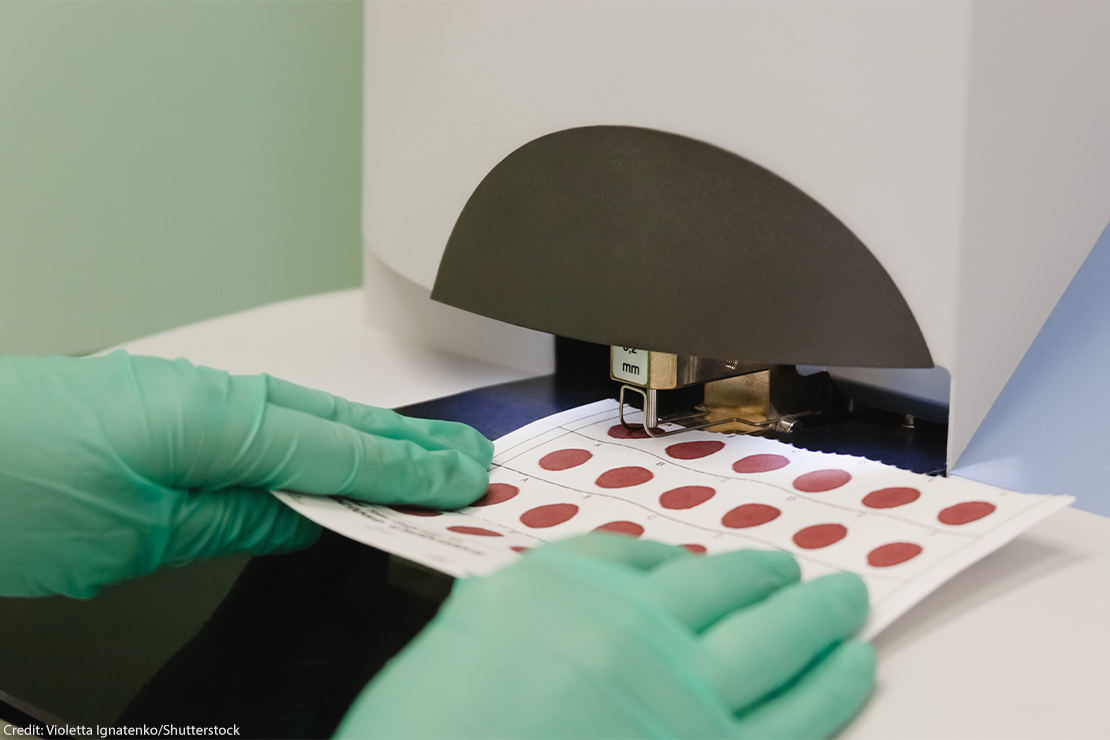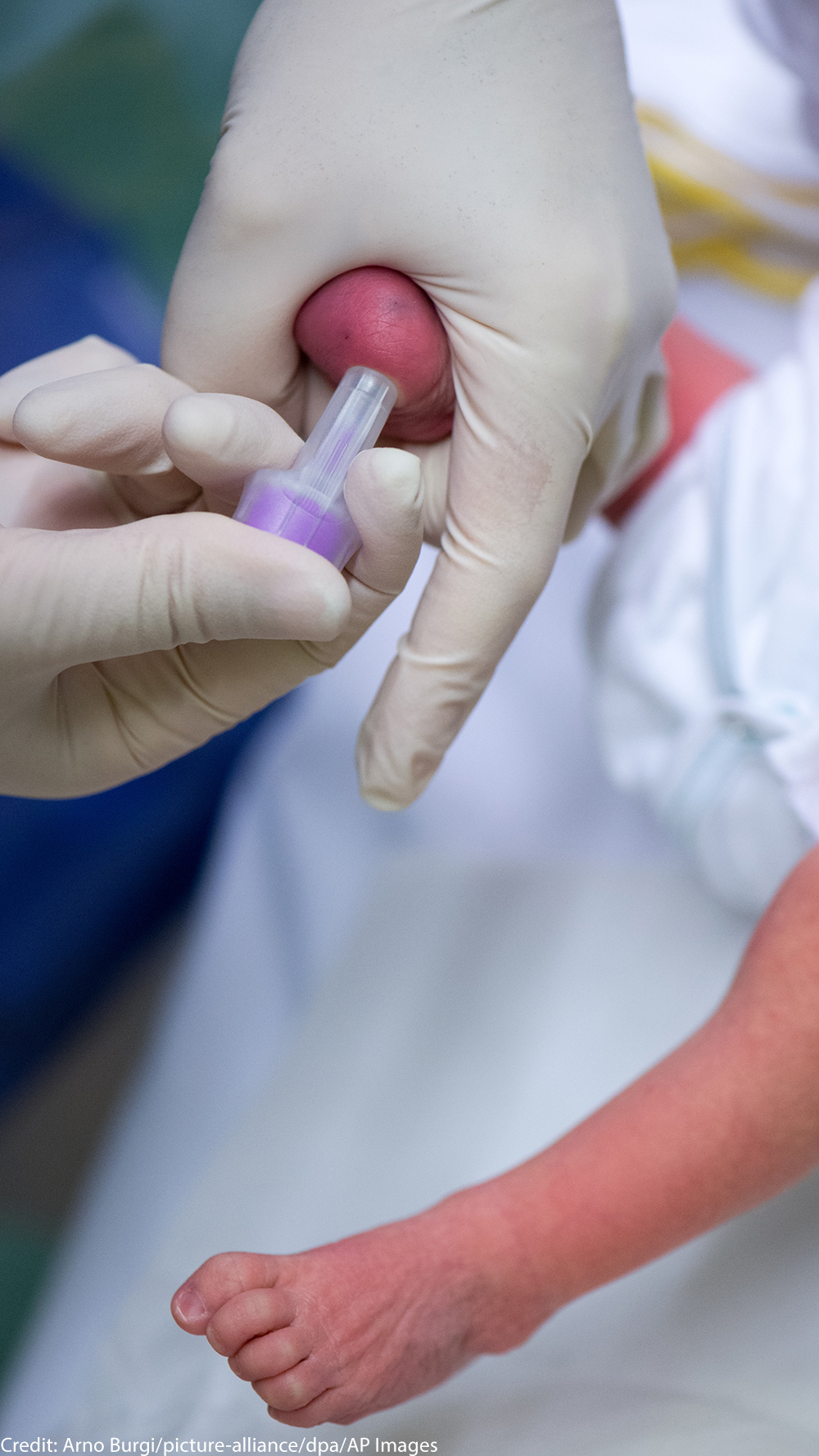Widespread Newborn DNA Sequencing Will Worsen Risks to Genetic Privacy


Newborn screening programs are a vital public health measure implemented in the U.S. and across the world, with about one third of babies born globally undergoing some screening. As part of this program in the U.S., nearly every baby born has blood drawn soon after birth, and that blood is tested for a panel of potentially life-threatening inherited disorders. Current newborn screening programs have been invaluable, both in lowering medical costs through early detection and intervention and in decreasing the toll of human suffering that comes from a late diagnosis. Unfortunately, innovation in this field is rapidly outpacing the law, leaving families vulnerable to privacy invasions.
In October 2022, a global consortium of scientists and other newborn DNA sequencing researchers convened to discuss a bold possibility for future care: Every baby born in the U.S. could have their full genome sequenced as an addition to existing newborn screening programs. This means that doctors would have on record all of the baby’s DNA, in addition to drawing their blood and testing for specific, known inherited disorders that can cause serious health problems at birth. The data derived from the blood samples now is fairly limited and only relevant to the baby’s health at birth. This includes data on the date, location, and time of birth; the mother’s name and address, the disorder being screened for, and a value indicating whether the baby is likely to have a particular hereditary disorder.
Police Access to Newborn DNA Sequencing Data
It doesn’t take much imagination to guess how this full genome sequencing could be abused. Last year, a public records lawsuit in New Jersey revealed a worrying new trend of police subpoenaing a newborn’s blood sample to implicate a child’s relative in a crime. Because of the lack of regulations surrounding DNA privacy, police in some states are able to access these samples, generate wildly detailed genetic profiles from them, and then use those profiles in criminal investigations. These samples, which were intended only to protect babies from life-threatening diseases, are instead being used by law enforcement to gather our highly personal and detailed genetic information, and to generate family trees dating back generations by uploading the DNA profile to consumer genetic databases operated by companies like GEDMatch.
Moreover, police departments’ systematic mistreatment of marginalized Americans may place them in greater danger of their genetic information being used against them and/or compelled from them. In an abhorrent practice that is currently the subject of a lawsuit, police in Orange County, California have been compelling genetic samples from people in exchange for dropping minor charges against them as part of a "Spit and Acquit" program. Additionally, police across the country have already constructed their own, unregulated genetic databases and have accessed medical samples of relatives — in one case using cells derived from a woman who had undergone a routine pap smear — all in the name of acquiring more detailed genetic data of people often not even accused of a crime.
If states expand their screenings to include the genome sequencing of newborns without new legal protections in place to prevent law enforcement access to this data, we will almost certainly see it abused. Widespread adoption of full genome sequencing would allow police to not only continue their current process of acquiring highly sensitive genetic information as part of criminal investigations, but could streamline it.
Without ironclad protections, a database containing genetic sequences of every baby born in a state will become a one-stop-shop for police. This poses a tremendous cost to public health: If parents are concerned about the privacy of their child’s genetic data, they may hesitate to participate in screening programs or opt out entirely, putting their babies at risk. This makes state regulation of newborn screening programs — including the samples themselves, as well as any data derived from them — essential.
A Patchwork of State Protections for Blood Sample Data
Currently, different states have differing policies on the length of time these blood samples are stored, with some states storing samples for only a few months and others storing them indefinitely. Similarly, policies governing the data associated with the blood samples vary state to state. For example, more than a quarter of states have no policy barring law enforcement access; some states protect the blood sample but not the associated data, and few states protect both.
In our previous blog post on this topic, Iowa was mentioned as a standard for other states to follow, but even Iowa’s law needs improvement in the face of proposals to optionally sequence newborn DNA. Although the Iowa law explicitly bars law enforcement access to newborn blood samples, it offers no such protections to the data associated with these samples. This is particularly worrying because it means even a state that has taken preventative steps to prevent law enforcement abuse of this public health program will see its policies easily circumvented if and when newborn DNA sequencing is incorporated into newborn screening.
These expanded newborn screening programs will likely result in the data associated with the blood sample being more revealing than the sample itself. Some states have tried to address the current privacy problems by destroying the blood samples, or shortening the length of time they are stored. However, this would do little if testing is expanded to the full genome, because data analyzed from these samples is not subject to the same rules. For this reason, states must act quickly to amend their newborn screening programs, and clarify that legal protections safeguard access to both the blood sample itself and any data associated with the sample.
Lawmakers and Researchers Should Act to Ensure Privacy
The need for state legislators to act is clear, but newborn DNA sequencing researchers and whole genome sequencing companies must also do their part. While researchers are eager to enroll communities of color in their pilot studies to gather more and genetically diverse data, it is unclear whether the researchers, their academic institutions, or the federally-regulated Institutional Review Board (which approves the use of human participants in research studies) are requiring participants be informed that the genetic information of their newborns may potentially be legally accessed and misused by police.
Additionally, companies involved in the sequencing, data transfer, and/or storage of newborn DNA sequencing data must also agree not to voluntarily allow police access to this data. With researchers encouraging thousands of parents to enroll their child in pilot studies for sequencing at no financial cost, the cost of this new technology to their genetic privacy must be conveyed to research participants.
Some states, such as New Jersey, have proposed new bills aimed at limiting police’s ability to access newborn screening samples. While bills like these are a step in the right direction, they must also explicitly prohibit law enforcement from accessing both the sample itself and any data associated with the screening program. The newborn screening program is too vital a public health intervention to be hijacked by police’s constant search for new methods to access our most personal information. Just as this program may change as technology advances, so must the protections states put in place.


